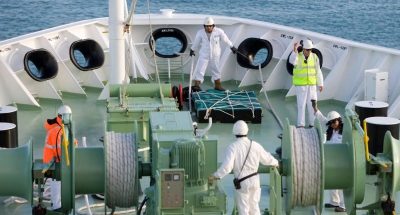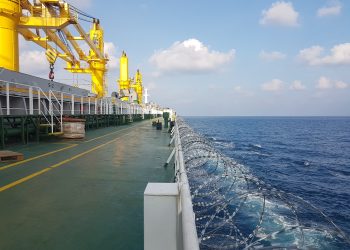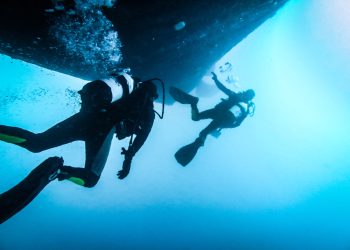Colin Gillespie, North P&I Club, notes that one of the biggest challenges for the industry is to retain the ‘right crew’ onboard. Mr. Gillespie highlights that safety culture and seafarer standards are closely linked, therefore it is important to keep onboard seafarers with the right ability and attitude, and talks about Club’s initiatives towards that end.
SAFETY4SEA: What do you think is the biggest challenge for the industry loss prevention wise?
Colin Gillespie: The biggest challenge for the industry from a loss prevention perspective is the quality of officers available to owners. The safety and efficiency of any shipping company is reliant upon quality officers. At North we call officers who have the right combination of knowledge, experience and attitude ‘The Right Crew’. Unfortunately pressures within the employment market mean that sometimes officers are employed who may not have sufficient knowledge or experience, or who do not have the right attitude to adopt company preferences, change their behavior or take good decisions. These officers require increased oversight onboard and from ashore. Ultimately they may make vessel operations both unsafe and inefficient. They are a small minority, most officers do a professional job in often difficult circumstances, but shortages mean that low quality officers tend to circulate in the employment market.
S4S: What do you believe are the most efficient loss prevention measures?
C.G.: Working hard every day with the goal of safe and efficient shipboard operations. There is no silver bullet. How this goal is achieved involves lots of different factors, and every company will approach it differently, but a firm commitment to safe and efficient operations is the most effective loss prevention measure. The ship-shore relationship is key here – mutual trust and understanding between ship and shore is vital to achieve the goal.
S4S: Have you realized any tangible benefits from the communication with your members so far that you would like to share?
C.G.: Yes. Our member review programme where we work with members who may have problematic claims records has been running for many years. It has been shown in many cases to reverse a trend of rising claims numbers for members subject to review. The process can be particularly effective where there is one significant issue for Members to address or, if more general issues are identified, where a Member is looking for ways to improve. Experience gained from previous reviews and our broad perspective of the claims environment allows lessons learnt to be shared with Members during reviews. They can then use this experience to develop processes that support improvements in their organisation.
S4S: Regarding the claims received from your members last year, which was the major contributor factor for the majority of them?
C.G.: Root cause analysis of high value claims, in particular the findings of failure to follow procedures, point to problems with safety culture in many incidents. Safety culture and seafarer standards are, of course, closely linked. If seafarers with the right ability and attitude are recruited, retained, trained and mentored then establishing and maintaining safety culture is less problematic.
S4S: Have you noticed any worrying trend during the last five to ten years?
C.G.: Perhaps the most concerning trend over this period has been the attitude of those ashore – particularly the authorities – to maritime accidents and incidents. The reaction of those ashore can be out of proportion to the seriousness of an incident. The reasons for this are complex but a combination of politics, increased environmental awareness and a lack of understanding of shipping are all contributing factors. This situation has not only led to increased claims costs but more importantly in the unjustified criminalization of seafarers, particularly vessel Masters, in some instances. Accidents happen and seafarers do not deliberately set out to cause collision, injury or spillage – should they then be treated as criminals?
Another area of concern for shipping is that there appears to be an increasing overreliance on advice from ashore by those on vessels even for routine matters. Reluctance to take decisions on board without input from ashore can transfer to safety critical situations requiring immediate decisions. This is perhaps an unintended consequence of the link between shore and ship established by the ISM Code allied with the ease of modern communication.
S4S: What should be the key priorities for the shipping industry for strengthening safety performance onboard and ashore?
C.G.: Shipping, despite the state of the markets over the past few years, is safer than ever with the number of incidents being reported falling steadily over the years. But with incidents becoming more costly and unacceptable, both socially and commercially, improvements still need to be made. One area that the industry should be looking to prioritize is safety culture – an area where current performance is patchy. Systems and procedures have served the industry well over an extended period but we may well be reaching the point where the returns from enhancing already comprehensive systems and procedures are disappearing. Focus should shift towards behavior and the interaction between systems and people. Organizational safety culture should be developed by encouraging the right kinds of behavior by individuals at all levels, throughout every department, both ashore and afloat, in shipping companies.
S4S: What best practices would you recommend from your perspective?
C.G.: Safety performance is directly linked to the quality of the crew, and in particular the officers, onboard. Having fit for purpose and workable safety management systems and procedures, running safety campaigns, setting safety goals, or trying to develop safety behavior in a company can only be effective if you employ the Right Crew. Using best practice to attract, recruit and retain the Right Crew should be a priority. North has produced a series of briefings which discuss best practice in these areas. Explore more here
S4S: How does the North P&I Club promote loss prevention across the industry?
C.G.: One role of North’s industry leading loss prevention department is to promote loss prevention to our Members and our activity is focused on benefitting our Members. Our work is guided by two working groups of members, one based in the Asia Pacific region and the other European based. Through these groups Members can share their concerns around safety and loss prevention and we can respond to Members’ concerns appropriately. Over the years we have developed many different means of communicating with our Members including member visits, crew seminars, member reviews, a loss prevention enquiry service, webinars, email bulletins, our maritime threats and incidents service and, of course, our more traditional means of communicating such as Signals magazine, and our comprehensive range of loss prevention guides, briefings, posters and other publications. A list of our publications can be found here
S4S: Are there any projects that you are working on right now regarding loss prevention?
C.G.: Yes. We are always working on various projects to improve the loss prevention service to our Members as well as continually reviewing and improving existing initiatives and material. We are currently looking at a couple of areas for development in relation to crew matters and safety culture.
S4S: What are your suggestions to industry stakeholders to enhance effectiveness of loss prevention best practices?
C.G.: Commit to safe and efficient operations at all levels of the company – ashore as well as afloat. Work hard every day with the goal of safe and efficient shipboard operations. Eventually this will deliver a well maintained fleet, with the Right Crew onboard, who exhibit the right behaviors and will implement your well designed systems. Your company will be both safe and efficient. There is no silver bullet.
The views presented hereabove are only those of the author and not necessarily those of SAFETY4SEA and are for information sharing and discussion purposes only.































































The biggest problem in shipping, is that ship-owners only look at the nearby future, to make a quick penny. Higher educated officers from the west are kicked out to be replaced by crews from cheaper countries. Cultural differences makes the work more unsafe. Furthermore, nowadays, the captain is not a decisionmaker anymore, and the office expects the captain and his officers to be mere operators.
This, together with unfavorable taxes and other regulations for the western seafarers, explains highly the loss of interest in a shipping career by the youth in the west. This is not going to change, as shipping companies expects the seafarers to be puppets.
Last I knew , Captain is never the “general agent ” of the Owners until the situation of latest LOF.So if he wants a job , he can take it , or lots of cheap replacements can be found.